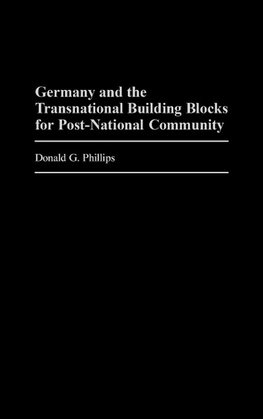
-
 Anglický jazyk
Anglický jazyk
Germany and the Transnational Building Blocks for Post-National Community
Autor: Donald G. Phillips
Phillips assesses prospects for post-national social coherence transcending the traditional nation-state, with a focus on events in Germany. European institutional integration has been seen as a stabilizing alternative to the nation-state system, a system... Viac o knihe
Na objednávku
98.10 €
bežná cena: 109.00 €
O knihe
Phillips assesses prospects for post-national social coherence transcending the traditional nation-state, with a focus on events in Germany. European institutional integration has been seen as a stabilizing alternative to the nation-state system, a system that resulted in two devastating world wars. However, economic interests appear to have been more effective instruments of transnational integration in Europe. Further, until 1989, part of this alternative vision was a divided Germany.
He explicitly links a focus upon the Federal Republic, central to post-Cold War Europe's future, with a study of private business, perhaps the most indispensable agent of Germany's post-1945 rehabilitation. Business support has been imperative to European integration. Nonetheless, if the European Union is attractive to members or potential members only for economic reasons, then no matter how wealthy its constituent parts may be, potential harmful effects of interstate competition will continue to pose a threat to social coherence of the EU, the Continent, and the world beyond. With the aid of analysis of companies largely perceived as being German, but which are increasingly transnational, Phillips shows how interdependent business needs may overcome nationalist and institutional conceptions in the transnational integration processes. For scholars, researchers, and policy makers involved with European integration, international relations, and German Studies.
- Vydavateľstvo: Praeger
- Rok vydania: 2000
- Formát: Hardback
- Rozmer: 235 x 157 mm
- Jazyk: Anglický jazyk
- ISBN: 9780275964900












